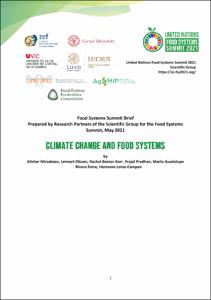Climate Change and Food SystemsFood Systems Summit Brief Prepared by Research Partners of the Scientific Group for the Food Systems Summit, May 2021

Climate Change and Food Systems
Food Systems Summit Brief Prepared by Research Partners of the Scientific Group for the Food Systems Summit, May 2021

| dc.contributor.author | Mirzabaev, Alisher | |
| dc.contributor.author | Olsson, Lennart | |
| dc.contributor.author | Bezner Kerr, Rachel | |
| dc.contributor.author | Pradhan, Prajal | |
| dc.contributor.author | Rivera Ferre, Marta Guadalupe | |
| dc.contributor.author | Lotze-Campen, Hermann | |
| dc.date.accessioned | 2021-07-07T21:01:55Z | |
| dc.date.available | 2021-07-07T21:01:55Z | |
| dc.date.issued | 01.05.2021 | |
| dc.identifier.uri | https://hdl.handle.net/20.500.11811/9206 | |
| dc.description.abstract | Climate change affects the functioning of all the components of food systems, often in ways that exacerbate existing predicaments and inequalities between regions of the world and groups in society. At the same time, food systems are a major cause for climate change, accounting for a third of all greenhouse gas emissions. Therefore, food systems can and should play a much bigger role in climate policies. This policy brief highlights nine actions points for climate change adaptation and mitigation in the food systems. The policy brief shows that numerous practices, technologies, knowledge and social capital already exist for climate action in the food systems, with multiple synergies with other important goals such as the conservation of biodiversity, safeguarding of ecosystem services, sustainable land management and reducing social and gender inequalities. Many of these solutions are presently being applied at local scales around the world, even if not at sufficient levels. Hence, the major effort for unleashing their potential would involve overcoming various technical, political- economic and structural barriers for their much wider application. Some other solutions require research and development investments now but focus on helping us meet the longer-term challenges of climate change on food systems in the second half of this century when most existing food production practices will face unprecedented challenges. In the short term, these pro- poor policy changes and support systems can create a range of positive changes well beyond food systems without delay. In the long-term, investments in research will help ensure food security and ecosystem integrity for coming generations. | en |
| dc.format.extent | 19 | |
| dc.language.iso | eng | |
| dc.rights | In Copyright | |
| dc.rights.uri | http://rightsstatements.org/vocab/InC/1.0/ | |
| dc.subject | Climate change | |
| dc.subject | Food systems | |
| dc.subject | Inequalities | |
| dc.subject.ddc | 333.7 Natürliche Ressourcen, Energie und Umwelt | |
| dc.title | Climate Change and Food Systems | |
| dc.title.alternative | Food Systems Summit Brief Prepared by Research Partners of the Scientific Group for the Food Systems Summit, May 2021 | |
| dc.type | Wissenschaftlicher Artikel | |
| dc.identifier.doi | https://doi.org/10.48565/scfss2021-x112 | |
| dc.publisher.name | Center for Development Research (ZEF) in cooperation with the Scientific Group for the UN Food System Summit 2021 | |
| dc.publisher.location | Bonn | |
| dc.rights.accessRights | openAccess | |
| dc.relation.url | https://sc-fss2021.org/wp-content/uploads/2021/05/FSS_Brief_Climate_Change_and_Food_Systems.pdf | |
| ulbbn.pubtype | Zweitveröffentlichung | |
| dc.version | updatedVersion |
Files in this item
This item appears in the following Collection(s)
-
FSS Briefs by Partners of Scientific Group (41)
"Food Systems Summit Briefs" are invited papers by the Scientific Group in support of the Summit agenda setting.




